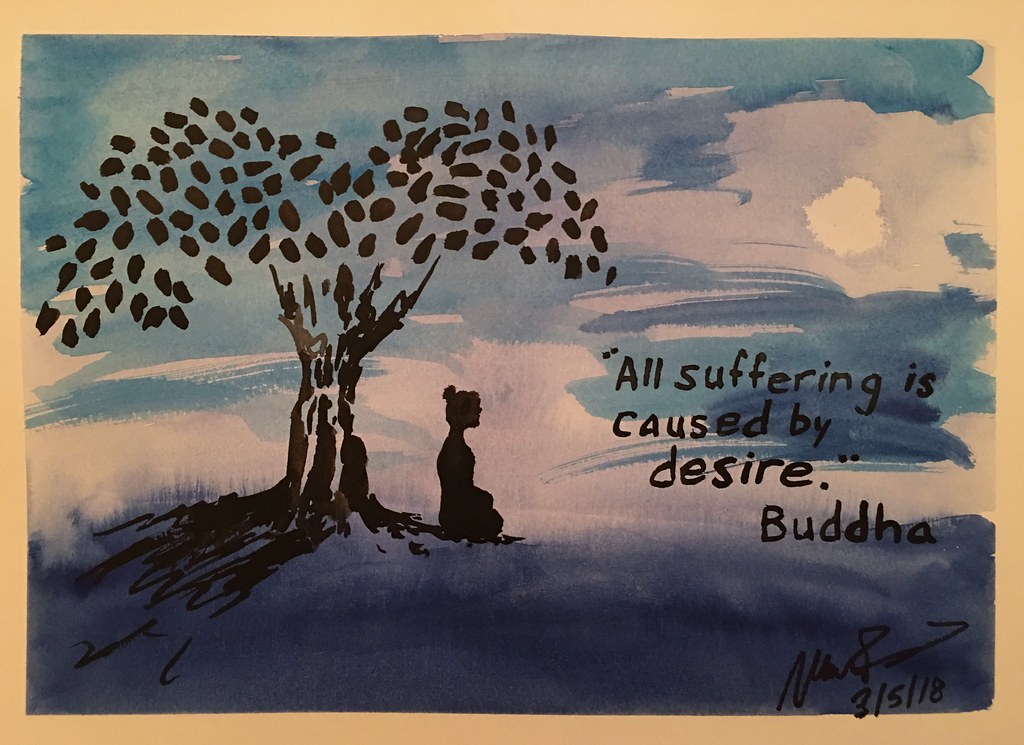
Human suffering was the one thing that disturbed prince Gottama to a point where he could not continue his comfortable life in the palace. He needed to find a way of diminishing it. And in order to do so, he left it all behind and secluded himself for years.
When we are ill, we normally have symptoms, like headaches, nausea, pain in parts of the body, blurry vision or fever. Usually, before it gets really bad we try to solve it by addressing these effects, such as painkillers, anti-fever and anti-nausea pills and so on. They will bring some relief and even diminish the illness, but it won’t solve the problem. Sometimes we abuse painkillers to the point of numbness. We have not resolved the issue, and most of the time, it will come back stronger, and will eventually be worse to deal with.
Understanding the origin of suffering

According to the Buddhist view (as many other faiths and philosophies) suffering is directly related to our perceptions of the external world. Suffering comes from what we have or can’t have, such as a perfect body, career, or relationship. We can even have them, but still suffer.
The origin of suffering is in our heart and soul, in the priorities we establish. It’s also in the way we deal with time and the impermanence of people and things. So suffering is not in the way someone treats us, but in how that interferes with our inner balance.
What is surprising is that this is not the only source. Since we all are one with the cosmos, if there is suffering in any other component of that unity, it doesn’t matter how well we can deal with external perceptions, we will feel pain as well.
The path out of suffering
Putting an end to suffering should be everyone’s goal. Personal suffering, the suffering of others and that of nature. Simone Weil, a French philosopher that died at a very young age would refuse to eat abundantly because she knew someone in another part of the world would be starving. I find that admirable. I confess I have not reached that level, but I am on my way there, with small, but firm steps.
Buddhists believe we are taught in many ways how to interpret life and manage our desires and it usually doesn’t include the idea of being a part of something greater than our own little selves.
When a baby is born, they instinctively sense that they are a part of a greater unit. Depending on the culture or on the dynamics of the family, this greater whole could be just mom, mom and dad, or even a larger family including grandparents, uncles, siblings. And it would be wonderful for all, if we were programmed to keep growing in this way to strengthen the concept of a unified whole.
But, as a reaction of our attachment to our bodily (material) self, we develop the need for individuality. That is the sentiment that leads to selfishness, and inadvertently suffering. A selfish person is at most committed to their own happiness if they believe they have a clear understanding of how to attain it. But once they reach that, they will still feel that something is missing.
Our choices and suffering
Let me tell you something that happened to me a few years ago. I was trying to get a promotion, which would mean a lot more money and social respect. I was working hard for that, day and night (not really night but before dawn I would be up). The day I was going to prove my ability was getting closer. That’s when I found out my son had failed his last exams and was risking repeating a school year. There was still a chance, but he would have to give it his all and I could not leave all that responsibility to an 11-year-old boy.
I came to a crossroads and had to choose. On one hand I could dedicate myself to getting promoted in my job (which was not certain) and make better money. This would allow more trips and eating out with my family and I would be proud of myself and my efforts. In order to do that I would have to leave my son on his own. It was very probable that he would fail because he was really having problems studying and committing to school on his own.
The other option was to give up my opportunity for promotion, and therefore, have more free time to help my son pass to the next grade (also not guaranteed). The thing that made my decision clear was imagining how it would be like to celebrate my promotion while my son suffered from seeing his friends move forward while he was left behind.
I didn’t think twice. The outcome didn’t matter. I knew what I had to do. Life is an ascendant spiral. You need to raise people with you in order to be fine. Joy is not complete any other way.
The Buddhist view
The suffering path is the one that leads us to evolution, and once we do evolve, our personal suffering ceases to exist. What happens next is the need to bring that relief to others. And we can do that by teaching or by being a living example.
Buddha has left us the meticulously organized path of the “middle way”, divided into eight steps (refer to our article on the middle way or Eight-fold path). Follow them, in your own personal way and share with others. As you evolve and feel you are impacting other lives, you will experience the motivation to overcome the difficulty of the other levels. In the meantime, don´t underestimate your suffering or anyone else’s. Have respect for that, until that is no more.










